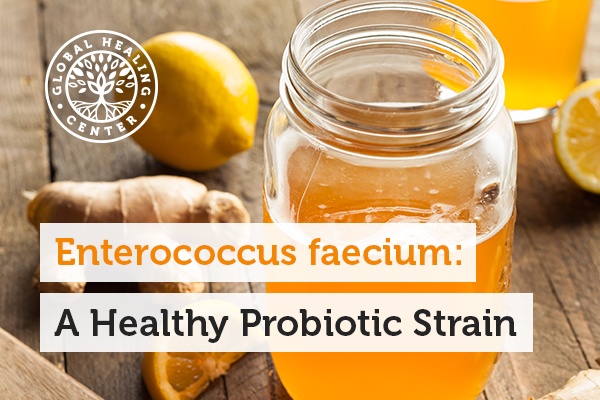
The gut is a delicate ecosystem that’s home to living organisms known as probiotics. Probiotics are helpful microbes that encourage good health by assisting with many different processes in the human body. They are probably best known for the contribution they make to gut health and digestion. Probiotics also support gastrointestinal health,[1] aid the immune system, and perform other specialized tasks — every probiotic strain serves a unique purpose. That’s why the best probiotic supplements provide a combination of probiotic strains to promote wellness from multiple angles. Let’s take a look at the benefits offered by Enterococcus faecium; it’s a multitasking strain that is worth considering when you’re looking at probiotic formulas.
What Is Enterococcus faecium?
Enterococcus is a large genus of bacteria to which the species Enterococcus faecium belongs. This bacterial species is gram-positive, spherical, and often occurs in pairs or chains, rather than clumps.[2] Mammals, including humans, usually have Enterococcus colonies already in and on their bodies, particularly in the gastrointestinal tract and on the skin.
Enterococcus faecium falls into the lactic acid bacteria group. It may seem confusing to anyone who regularly takes probiotics since Enterococcus faecium is not in the Lactobacillus genus, a group of probiotic bacteria commonly found in probiotic supplements. The lactic acid bacteria group is a group of bacteria to which numerous species of bacteria belong. These bacteria are typically beneficial and named for the lactic acid they produce as a metabolic byproduct of fermentation.[3]
Health Benefits of Enterococcus faecium
One of the major benefits of including Enterococcus faecium in probiotic formulas is that it’s uniquely suited to survive the digestive process and flourish in the gut. Somewhat ironically, Enterococcus faecium is added to livestock feed instead of pharmaceutical antibiotics as an antibiotic substitute to promote wellness in animals. Like other probiotics, Enterococcus faecium promotes a balanced gut environment by competing for resources that harmful organisms would otherwise consume and use to grow, possibly leading to illness.
Enterococcus faecium also competes with harmful organisms for adhesion sites — areas on the surface of cells to which other cells and molecules can bind.[2] Harmful microorganisms exploit these sites and infect healthy human cells. Probiotic bacteria protect these sites by taking up position and establishing a protective barrier in the gut.
The results of animal research indicate that the probiotic benefits of Enterococcus faecium include boosted immune cell function, improved regulation of cell proliferation, and elevated fat burning capacity.[2, 4] These studies have promising applications for human health, but require further research at this time.
Enterococcus faecium in Food Technology
Not limited to animal agriculture, Enterococcus faecium also has a place in the food biotechnology industry. The presence of the bacteria in certain foods helps develop flavors and aromas.[5] In cheese production, Enterococcus faecium reduces the risk of listeria growth, which makes it a good candidate for a possible co-culture in food fermentation processes.[6]
Safety of Different Strains of Enterococcus faecium
If you type Enterococcus faecium into a search engine and click a search result at random, you’ll inevitably see a few messages of caution. However, it’s important to note that there are variants, or strains, within the bacterial species — something that may not be immediately clear while performing cursory research. Certain strains within a given microbial species can be virulent,[7] while others may be benign or beneficial. Such is the case with Enterococcus faecium. The strains of Enterococcus faecium used in probiotic supplements today are the non-pathogenic varieties that provide health benefits.Best Sources for Enterococcus faecium Probiotics
If you’re considering the benefits of Enterococcus faecium, you might be curious where you can find it. Fermented products like raw milk cheese,[6] kefir, and kombucha all contain this health-boosting probiotic.[2] These rich sources of probiotics might not be available in your area, or they might be a little too exotic for your tastes. But, probiotic supplements that include Enterococcus faecium are a fantastic and easy way to help promote balance in the gut.
We recommend probiotic supplement Global Healing's Ultimate Probiotic, an advanced blend of 25 probiotics and prebiotics, to keep your digestive tract healthy and balanced. It’s perfect for anyone who is trying to reset their gut, experience better intestinal health, or promote a healthy balance of microflora.
References (7)
- "Probiotics: In Depth." U.S. Department of Health and Human Services. National Institutes of Health. NCCIH, 22 Dec. 2016. Web. 10 Jan. 2017.
- “The Genus Enterococcus as Probiotic.” Brazilian Archives of Biology and Technology 56.3 (2013): 457–466. Web. 10 Jan. 2017.
- Ljungh, Åsa, and Torkel Wadström. "Lactic Acid Bacteria as Probiotics." 2006. Web. 6 Feb. 2017.
- Grootaert, C, et al. “Bacterial Monocultures, Propionate, Butyrate and H2O2 Modulate the Expression, Secretion and Structure of the Fasting-Induced Adipose Factor in Gut Epithelial Cell Lines.” Environmental microbiology. 13.7 (2011): 1778–89. Web. 3 Feb. 2017.
- Franz, Charles M. A. P., et al. “Enterococci in Foods—a Conundrum for Food Safety.” International Journal of Food Microbiology 88.s 2–3 (2003): 105–122. Web. 10 Jan. 2017.
- Leroy, F., M. R. Foulquié Moreno, and L. De Vuyst. “Enterococcus faecium RZS C5, an Interesting Bacteriocin Producer to Be Used as a Co-Culture in Food Fermentation.” International Journal of Food Microbiology 88.s 2–3 (2003): 235–240. Web. 10 Jan. 2017.
- Mannu, L., et al. “Comparison of the Incidence of Virulence Determinants and Antibiotic Resistance Between Enterococcus Faecium Strains of Dairy, Animal and Clinical Origin.” International Journal of Food Microbiology 88.s 2–3 (2003): 235–240. Web. 10 Jan. 2017.
†Results may vary. Information and statements made are for education purposes and are not intended to replace the advice of your doctor. If you have a severe medical condition or health concern, see your physician.







